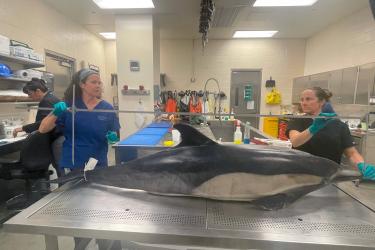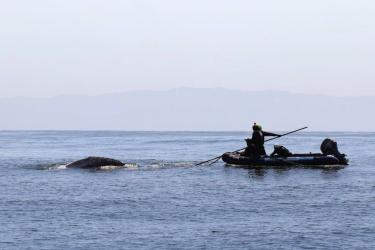The call came in on a Saturday morning. Lifeguards showing up for their morning shift found a dead dolphin washed up on the beach in La Jolla, California. They called the stranding hotline, and the Marine Mammal Health and Stranding Network responded.
Kerri Danil, a marine biologist at NOAA’s Southwest Fisheries Science Center, took the case. It involved a male long-beaked common dolphin, a calf between six and eight months of age. There were no obvious signs of trauma or disease, so for the moment, the cause of death remained a mystery.
Danil performed a necropsy on the animal in order to determine the cause of death. But that wasn’t the only reason to investigate.
Marine mammals are exposed to the same environmental toxins that humans are exposed to. Flame-retardants, pesticides, PCB’s, and other toxic compounds all eventually make their way into the sea. And because of biomagnification, these compounds become more concentrated as they work their way up the food chain. Since marine mammals eat high on the food chain, they are exposed to much higher doses of these toxins than humans are.
Animals like the one that washed up on the beach in La Jolla are like forensic capsules spit out by the sea. During their lifetime they accumulate environmental toxins in their tissues. When we necropsy them, they offer up their data, telling us what compounds they were exposed to and how much, and also what health problems they were living with.
We have a lot in common with marine mammals. After all, they’re mammals like us, and environmental contaminants affect their health and ours in many of the same ways. What’s more, because they’re exposed to such high doses of toxic compounds, marine mammals are like the proverbial canary in a coal mine. We need to monitor their health because it’s an important way of monitoring our own.
Of course, we also care about marine mammals for their own sake. To find out why that dolphin calf washed up dead on the beach in La Jolla, California, listen to this podcast.
To learn more about dolphin health and regional stranding networks, visit the Marine Mammal Health and Stranding Response Program website.


